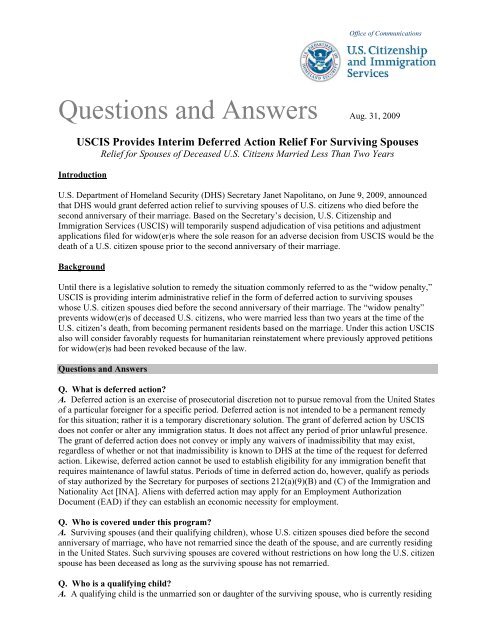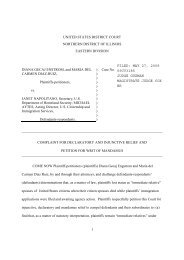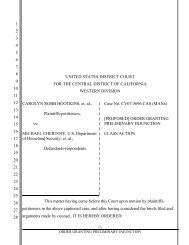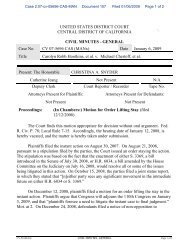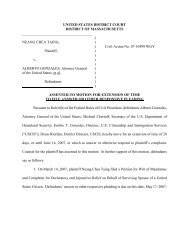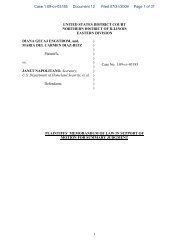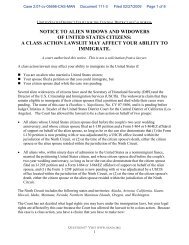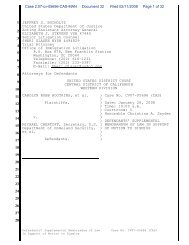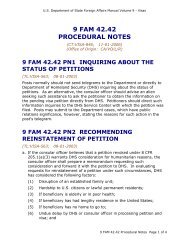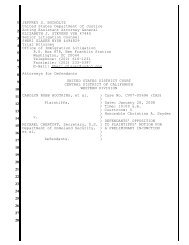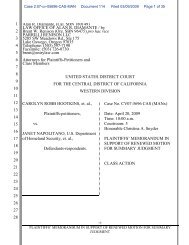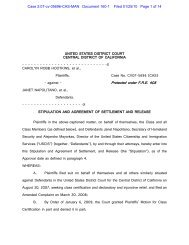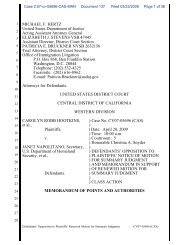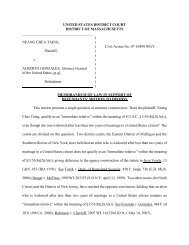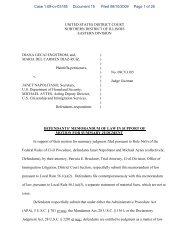USCIS Provides Interim Deferred Action Relief For Surviving Spouses
USCIS Provides Interim Deferred Action Relief For Surviving Spouses
USCIS Provides Interim Deferred Action Relief For Surviving Spouses
You also want an ePaper? Increase the reach of your titles
YUMPU automatically turns print PDFs into web optimized ePapers that Google loves.
Office of Communications<br />
Questions and Answers Aug. 31, 2009<br />
<strong>USCIS</strong> <strong>Provides</strong> <strong>Interim</strong> <strong>Deferred</strong> <strong>Action</strong> <strong>Relief</strong> <strong>For</strong> <strong>Surviving</strong> <strong>Spouses</strong><br />
<strong>Relief</strong> for <strong>Spouses</strong> of Deceased U.S. Citizens Married Less Than Two Years<br />
Introduction<br />
U.S. Department of Homeland Security (DHS) Secretary Janet Napolitano, on June 9, 2009, announced<br />
that DHS would grant deferred action relief to surviving spouses of U.S. citizens who died before the<br />
second anniversary of their marriage. Based on the Secretary’s decision, U.S. Citizenship and<br />
Immigration Services (<strong>USCIS</strong>) will temporarily suspend adjudication of visa petitions and adjustment<br />
applications filed for widow(er)s where the sole reason for an adverse decision from <strong>USCIS</strong> would be the<br />
death of a U.S. citizen spouse prior to the second anniversary of their marriage.<br />
Background<br />
Until there is a legislative solution to remedy the situation commonly referred to as the “widow penalty,”<br />
<strong>USCIS</strong> is providing interim administrative relief in the form of deferred action to surviving spouses<br />
whose U.S. citizen spouses died before the second anniversary of their marriage. The “widow penalty”<br />
prevents widow(er)s of deceased U.S. citizens, who were married less than two years at the time of the<br />
U.S. citizen’s death, from becoming permanent residents based on the marriage. Under this action <strong>USCIS</strong><br />
also will consider favorably requests for humanitarian reinstatement where previously approved petitions<br />
for widow(er)s had been revoked because of the law.<br />
Questions and Answers<br />
Q. What is deferred action?<br />
A. <strong>Deferred</strong> action is an exercise of prosecutorial discretion not to pursue removal from the United States<br />
of a particular foreigner for a specific period. <strong>Deferred</strong> action is not intended to be a permanent remedy<br />
for this situation; rather it is a temporary discretionary solution. The grant of deferred action by <strong>USCIS</strong><br />
does not confer or alter any immigration status. It does not affect any period of prior unlawful presence.<br />
The grant of deferred action does not convey or imply any waivers of inadmissibility that may exist,<br />
regardless of whether or not that inadmissibility is known to DHS at the time of the request for deferred<br />
action. Likewise, deferred action cannot be used to establish eligibility for any immigration benefit that<br />
requires maintenance of lawful status. Periods of time in deferred action do, however, qualify as periods<br />
of stay authorized by the Secretary for purposes of sections 212(a)(9)(B) and (C) of the Immigration and<br />
Nationality Act [INA]. Aliens with deferred action may apply for an Employment Authorization<br />
Document (EAD) if they can establish an economic necessity for employment.<br />
Q. Who is covered under this program?<br />
A. <strong>Surviving</strong> spouses (and their qualifying children), whose U.S. citizen spouses died before the second<br />
anniversary of marriage, who have not remarried since the death of the spouse, and are currently residing<br />
in the United States. Such surviving spouses are covered without restrictions on how long the U.S. citizen<br />
spouse has been deceased as long as the surviving spouse has not remarried.<br />
Q. Who is a qualifying child?<br />
A. A qualifying child is the unmarried son or daughter of the surviving spouse, who is currently residing
in the United States. Generally, a qualifying child must be younger than age 21 at the time the request for<br />
deferred action is made. However, in some cases a qualifying child may be older than age 21 based upon<br />
having had a <strong>For</strong>m I-130 previously filed on his or her behalf as an immediate relative when younger than<br />
age 21, as provided by the “age-out” provisions in section 201(f) of the INA.<br />
Q. Can my children be considered eligible for deferred action on my <strong>For</strong>m I-360 or must I file<br />
separate <strong>For</strong>ms I-360 on their behalf?<br />
A. Yes, qualifying children can be listed on your <strong>For</strong>m I-360 request for deferred action. You are not<br />
required to file an individual <strong>For</strong>m I-360 for each child. If you are eligible for deferred action and have<br />
filed a <strong>For</strong>m I-360 naming your children as part of your request for deferred action, your children may<br />
also be eligible for deferred action. , <strong>Deferred</strong> action under this program is also available to the<br />
qualifying children of the surviving spouse who are younger than age 21 (at the time the request for<br />
deferred action is submitted or a <strong>For</strong>m I-130 was filed on their behalf as an immediate relative); currently<br />
residing in the United States; and unmarried. Your qualifying children are also eligible for consideration<br />
for a grant of deferred action relief based on your <strong>For</strong>m I-360.<br />
Q. Are the children of my deceased U.S. citizen spouse covered under this program?<br />
A. That depends on whether they are your children as well. Generally, your stepchildren through<br />
marriage to the U.S. citizen would be considered your children, and thus covered under this program, as<br />
long as your marriage took place when the child was younger than age 18. If those children did not<br />
already derive U.S. citizenship through your deceased spouse at birth or on entry into the United States<br />
under the Child Citizenship Act of 2000, they may be covered under this program.<br />
Q. Are my children, who are not the children of my deceased U.S. citizen spouse, covered under<br />
this program?<br />
A. Yes. The program covers your children in the United States, as long as they meet the definition of<br />
your “child” in section 101(b) of the INA, regardless whether or not they are also the children of your<br />
deceased U.S. citizen spouse.<br />
Q. Are any children who were born in the United States covered under this program?<br />
A. No. Children born in the United States are U.S. citizens by birth, and are not subject to the<br />
immigration process involved in this program.<br />
Q. What if I am a widow(er) of a deceased U.S. citizen, and I live outside the United States?<br />
A. You must be living in the United States to be eligible to request deferred action under this program.<br />
Q. Who is not covered under this program?<br />
A. This program does not cover surviving spouses or qualifying children of deceased U.S. citizens who<br />
are residing outside the United States or surviving spouses and children of a lawful permanent resident or<br />
other non-U.S. citizen. This program also does not cover surviving spouses or qualifying children of<br />
deceased U.S. citizens if the surviving spouse remarried at any time after the U.S. citizen’s death<br />
(regardless of whether or not the subsequent marriage has been terminated). The program does not cover<br />
any beneficiary who was legally separated from his or her U.S. citizen spouse at the time of the citizen’s<br />
death, or such beneficiary’s children.<br />
Q. My spouse and I were married for more than two years at the time of the U.S. citizen’s death,<br />
am I covered under this program.?<br />
A. If you meet the requirements of section 201(b)(2)(A)(i) of the INA, as the widow/widower of a U.S.<br />
citizen, and had been married more than two years at the time of the U.S. citizen’s death, you are not<br />
covered by this program. You may file a <strong>For</strong>m I-360, Petition for Amerasian, Widow(er), or Special<br />
Immigrant, in accordance with the instructions on the <strong>For</strong>m as an immediate relative based upon a<br />
self-petition, as long as the <strong>For</strong>m I-360 is filed within two years after the date of death.
Q. What if my U.S. citizen spouse died and I remarried, but my marriage to the new spouse has<br />
been terminated by divorce or death?<br />
A. If you are claiming to be a surviving spouse, based on a prior spousal relationship to a now deceased<br />
U.S. citizen and have remarried after the death of your previous U.S. citizen spouse, you are not eligible<br />
for deferred action under this program, regardless of whether your subsequent marriage ended due to a<br />
divorce from or the death of your subsequent spouse.<br />
Q. What if a stand-alone <strong>For</strong>m I-130 was filed and not approved before the death of my U.S.<br />
citizen spouse?<br />
A. If you did not file your <strong>For</strong>m I-130 with the <strong>For</strong>m I-485, you will need to submit to the Vermont<br />
Service Center a <strong>For</strong>m I-360, Petition for Amerasian, Widow(er), or Special Immigrant, with the<br />
appropriate filing fee, with a copy of the <strong>For</strong>m I-130 receipt notice and the documents requested in the<br />
<strong>For</strong>m I-360 filing instructions. On the <strong>For</strong>m I-360, you must check box “m. Other, explain:” in Part 2 of<br />
the petition and mark the basis for eligibility as “<strong>Deferred</strong> <strong>Action</strong> -- <strong>Surviving</strong> spouse of a deceased U.S.<br />
citizen, married less than two years.”<br />
Q. What if my deceased U.S. citizen spouse never filed a <strong>For</strong>m I-130 on my behalf?<br />
A. If you were legally married for less than two years to a now deceased U.S. citizen, at the time of the<br />
U.S. citizen’s death, you may submit a completed <strong>For</strong>m I-360, with the appropriate filing fee to the<br />
Vermont Service Center, if a <strong>For</strong>m I-130 was not filed on your behalf. You must check box “m. Other,<br />
explain:” in Part 2 of the petition and cite the basis for eligibility as “<strong>Deferred</strong> <strong>Action</strong> -- <strong>Surviving</strong> spouse<br />
of a deceased U.S. citizen, married less than two years.”<br />
Q. What if my <strong>For</strong>m I-130 was denied due to the death of my U.S. citizen spouse?<br />
A. If you are the surviving spouse of a U.S. citizen petitioner whose petition was denied by <strong>USCIS</strong> due<br />
to the death of the U.S. citizen petitioner, and prior to the issuance of this guidance, you may submit a<br />
completed <strong>For</strong>m I-360, with the appropriate filing fee to the Vermont Service Center. The beneficiary<br />
must check box “m. Other, explain:” in Part 2 of the petition and cite the basis for eligibility as<br />
“<strong>Deferred</strong> <strong>Action</strong> -- <strong>Surviving</strong> spouse of a deceased U.S. citizen, married less than 2 years.”<br />
Q. What if my U.S. citizen spouse filed a <strong>For</strong>m I-130 on my behalf concurrently with my <strong>For</strong>m I-<br />
485 before his or her death?<br />
A. You will remain eligible to receive interim benefits, such as employment authorization and advance<br />
parole, based on the pending adjustment of status application.<br />
Q. What if I was legally separated or divorced from my U.S. citizen spouse at the time of his or her<br />
death?<br />
A. If you were legally separated from your U.S. citizen spouse at the time of his or her death, you are not<br />
eligible for deferred action under this program. If you were not legally married to the deceased U.S.<br />
citizen at the time of his or her death, then a qualifying relationship does not exist and you are not eligible<br />
for deferred action under this program.<br />
Q. What if my deceased U.S. citizen spouse filed a <strong>For</strong>m I-130 on my behalf, which was approved<br />
prior to his or her death?<br />
A. Once <strong>USCIS</strong> has received notice of the death of the U.S. citizen petitioner, the approved I-130 petition<br />
is automatically revoked pursuant to 8 CFR 205.1 (a)(3)(i)(C). However, you, as the beneficiary of that<br />
petition, may request humanitarian reinstatement of the revoked petition. <strong>USCIS</strong> may then exercise<br />
discretion and grant the reinstatement after reviewing the facts and humanitarian considerations of your<br />
particular case. To request humanitarian reinstatement, pursuant to 8 CFR 205.1(a)(3)(i)(C)(2), you must<br />
submit your request in writing, along with any supporting documents, to the <strong>USCIS</strong> office with<br />
jurisdiction over your petition.<br />
Q. Is there a form to complete to request humanitarian reinstatement of an automatically revoked
<strong>For</strong>m I-130?<br />
A. No, to request humanitarian reinstatement, under 8 CFR 205.1(a)(3)(i)(2), you must submit your<br />
request in writing, along with any supporting documents, to the <strong>USCIS</strong> office with jurisdiction over the<br />
petition. Be sure to provide all relevant receipt numbers and carefully follow any directions or requests<br />
for evidence issued by that office.<br />
Q. What happen if my request for humanitarian reinstatement is approved?<br />
A. If your request for humanitarian reinstatement is approved, you may proceed to the adjustment of<br />
status or consular processing stage of the immigration process.<br />
Q. What if my request for humanitarian reinstatement is denied?<br />
A. If your request for humanitarian reinstatement is denied and you were legally married to the deceased<br />
U.S. citizen petitioner for two years prior to his or her death, you may be eligible to file a self-petition<br />
<strong>For</strong>m I-360 pursuant to INA 201(b)(2)(A)(i) as an immediate relative widow/widower with the Vermont<br />
Service Center.<br />
If your request for humanitarian reinstatement is denied and you were not married to the deceased U.S.<br />
citizen petitioner for two years at the time of his or her death, you may be eligible to request deferred<br />
action by submitting <strong>For</strong>m I-360 based on the program described herein. (Please refer to the information<br />
pertaining to a denied <strong>For</strong>m I-130 due to the death of the U.S. citizen petitioner.)<br />
Q. What if my case is covered by Court of Appeals case law regarding surviving spouses?<br />
A. There is continuing litigation on the subject of appropriate immigration classification of surviving<br />
spouses of U.S. citizens whose marriages were of less than two years’ duration at the time of death. U.S.<br />
courts of appeal for the First, Sixth, and Ninth Circuits have issued decisions holding that such spouses<br />
should be considered as immediate relatives notwithstanding the death of the U.S. citizen spouse. In cases<br />
subject to the law of these three circuits, these surviving spouses will be entitled to continuing immediate<br />
relative consideration and an application for deferred action is not necessary.<br />
Q. I entered the United States on a K-1, Fiancé(e) nonimmigrant visa and married my U.S. citizen<br />
spouse within the required 90-day period, but my spouse died before the 2-year anniversary of our<br />
marriage. Can I request deferred action under this program?<br />
A. Yes, you can request deferred action under this program.<br />
Q. I entered the United States on a K-1, Fiancé(e) nonimmigrant visa, but married a U.S. citizen<br />
other than the U.S. citizen who sponsored me for the K-1 visa. My spouse died before the two-year<br />
anniversary of our marriage. Can I request deferred action under this program?<br />
A. Yes, you can request deferred action under this program.<br />
Q. I entered the United States on a K-1, Fiancé(e) nonimmigrant visa, but married my U.S. citizen<br />
spouse after the 90-day period, and my spouse died before the two-year anniversary of our<br />
marriage. Can I request deferred action under this program?<br />
A. Yes, you can request deferred action under this program.<br />
Q. I entered the United States on a K-3, spousal nonimmigrant visa (while my I-130 was pending)<br />
and my U.S. citizen spouse died before the two-year anniversary of our marriage and before the<br />
adjudication of my I-130. Can I request deferred action under this program?<br />
A. Yes, you can request deferred action under this program.<br />
Q. I am a surviving alien spouse of a U.S. citizen, and I am in detention pending removal. Can I<br />
apply for deferred action?<br />
A. Yes, however, you cannot apply for this program with <strong>USCIS</strong>. You must seek deferred action from<br />
Immigration and Customs Enforcement (ICE).
Q. What forms and fees must be submitted in order to request deferred action with <strong>USCIS</strong>?<br />
A. You must submit a completed <strong>For</strong>m I-360, Petition for Amerasian, Widow(er), or Special Immigrant,<br />
with the $375 filing fee, which may not be waived. You must check box “m. Other, explain:” in Part 2<br />
of the petition and cite the basis for eligibility as “<strong>Deferred</strong> <strong>Action</strong> -- <strong>Surviving</strong> spouse of a deceased U.S.<br />
citizen, married less than two years.” In addition to the Part 2 information described above, you must<br />
complete Parts 1, 3, 4, 7, 9, 10, and 11 of the <strong>For</strong>m I-360. NOTE: While <strong>USCIS</strong> is using <strong>For</strong>m I-360 for<br />
these deferred action requests, such filings are not immigrant self-petitions under current law. They will<br />
be adjudicated as requests for deferred action only.<br />
Q. Which <strong>USCIS</strong> office processes <strong>For</strong>m I-360 requests for deferred action?<br />
A. The <strong>For</strong>m I-360 petition request for deferred action is adjudicated at the Vermont Service Center.<br />
Q. Will I be eligible for a <strong>For</strong>m I-360 fee waiver when I submit my request for consideration under<br />
this program?<br />
A. No, the $375 application fee cannot be waived.<br />
Q. What is the time limitation when filing for deferred action?<br />
A. The time limitation for requesting deferred action as the surviving spouse of a U.S. citizen married<br />
less than two years is two years from the issuance of the Secretary’s directive to DHS on May 27, 2009.<br />
This program may be revised as needed.<br />
Q. What documentation will I need to provide with the <strong>For</strong>m I-360?<br />
A. You must provide the documentation requested from widows/widowers of U.S. citizens on page two<br />
of the <strong>For</strong>m I-360 instructions, including marriage certificate, proof of termination of prior marriages,<br />
evidence of your late spouse’s U.S. citizenship, and your late spouse’s death certificate.<br />
Q. When I submit the <strong>For</strong>m I-360 to request deferred action under this program, am I considered<br />
a self-petitioning widow or special immigrant?<br />
A. No. Since your U.S. citizen spouse died before the second anniversary of your marriage, you are not<br />
eligible to be considered as a self-petitioning widow(er), pursuant to INA 201(b)(2)(A)(i). Also, when<br />
you submit your <strong>For</strong>m I-360, you will be checking the box marked “m. Other, explain:” and writing in<br />
the following: “<strong>Deferred</strong> <strong>Action</strong> – <strong>Surviving</strong> spouse of a deceased U.S. citizen, married less than two<br />
years.” which shows that you are applying under the temporary <strong>USCIS</strong> program which is meant to<br />
address the “widow penalty” as an interim measure. Therefore, for <strong>USCIS</strong> purposes, you will not be<br />
considered a self-petitioning special immigrant. Instead, you will be considered an applicant for deferred<br />
action only.<br />
Q. What factors will <strong>USCIS</strong> consider in deciding my deferred action request?<br />
A. A grant of deferred action is a discretionary action on the part of <strong>USCIS</strong>. In addition to basic<br />
eligibility criteria as described elsewhere in these Questions and Answers, <strong>USCIS</strong> will consider whether<br />
any serious adverse factors exist, such as national security concerns, significant immigration fraud,<br />
commission of other crimes, or public safety reasons, that counsel against granting deferred action. In<br />
addition, applicants whose visa petition was denied or revoked for any reason other than or in addition to<br />
the death of the petitioning U.S. citizen spouse are not eligible for deferred action under this program.<br />
Q. What if my deferred action request is approved?<br />
A. You will be issued a decision letter that will inform you that you have been granted deferred action for<br />
a validity period of two years and that you may request employment authorization using existing<br />
procedures.<br />
Q. If I am granted deferred action, does that mean I’m on a path to lawful permanent residence?<br />
A. No. This is a program for those who are not eligible for lawful permanent residence under current law.<br />
While it is possible that Congress may enact legislation in the future providing you with the opportunity
to become a lawful permanent resident, that is entirely up to Congress and cannot be guaranteed. In<br />
addition, a grant of deferred action does not mean that you have been determined to be eligible for<br />
adjustment of status or other grant of lawful permanent resident status, except for the fact that your spouse<br />
died before two years of marriage. There may be other disqualifying criteria under the INA that apply to<br />
you. <strong>Deferred</strong> action means only that DHS, as a matter of discretion, has temporarily authorized you to<br />
remain in the United States, and to apply for a grant of work authorization if you have economic necessity<br />
for employment.<br />
Q. Can I appeal the denial of a deferred action request?<br />
A. No. The decision by <strong>USCIS</strong> to deny a deferred action request cannot be appealed.<br />
Q. Can I work while in deferred action status?<br />
A. Yes, in many cases. Applicants and their qualifying children who are granted deferred action relief<br />
under this program are eligible to apply for an Employment Authorization Document (EAD) by filing<br />
<strong>For</strong>m I-765, Application for Employment Authorization, with the appropriate fee and a copy of your<br />
deferred action grant letter, in accordance with the <strong>For</strong>m I-765 instructions. The <strong>For</strong>m I-765 should be<br />
submitted to the Vermont Service Center. You will be required to list your assets, income, and expenses<br />
to demonstrate economic necessity, in accordance with 8 CFR 274a.12(c)(14).<br />
Q. How long will the EAD permit me to work in the United States?<br />
A. The particular EAD that you may be eligible for under this program will be granted for a maximum<br />
period of two years, not to exceed the expiration date of the grant of deferred action relief. All applicants<br />
requesting an EAD, based on a grant of deferred action, must demonstrate an economic necessity,<br />
pursuant to 8 CFR 274a.12(c)(14).<br />
Q. Am I eligible for advance parole to travel abroad and return to the United States while in<br />
deferred action status?<br />
A. Yes, as a surviving spouse, who has been granted deferred action relief under this program, you and<br />
your qualifying children are eligible to apply for advance parole by filing <strong>For</strong>m I-131, Application for<br />
Travel Document, with the appropriate fee and a copy of your deferred action grant letter, in accordance<br />
with the <strong>For</strong>m I-131 instructions. The <strong>For</strong>m I-131 may be filed with the <strong>For</strong>m I-765 to the Vermont<br />
Service Center. If your application for advance parole is granted, you will be issued a document that will<br />
be valid for a period not to exceed the expiration date of your granted deferred action relief. However,<br />
departure from the United States and return, even under a grant of advance parole, may adversely affect<br />
eligibility for adjustment of status of aliens with past periods of unlawful presence.<br />
NOTE: If you are granted deferred action relief and you travel outside of the United States without first<br />
being approved for advance parole, you may not be permitted to travel to or re-enter the United States.<br />
–<strong>USCIS</strong> –


